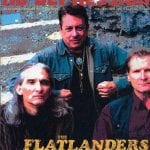David Barbe – Learning the curve
Relaxing on a cozy couch in the control room of his studio, Chase Park Transduction, David Barbe is doing his best to recall the twists and turns of his musical career. But after 30 minutes, he’s talked almost as much about his love of baseball, his hatred of the corporate record industry, and his current fascination with Michael Azerrad’s indie-rock book Our Band Could Be Your Life.
Barbe (pronounced just like the doll) may be best-known for his early ’90s tour of duty as the bassist in Bob Mould’s Sugar. Before that, he was the leader of Mercyland, one of Athens’ most explosive and influential ’80s punk bands. And in the mid-’90s he fronted Buzz Hungry, another hard-rocking Athens outfit.
Since 1997, when he opened Chase Park Transduction with two partners, he’s spent most of his time as an engineer and producer. His credits include such diverse projects as Son Volt’s Wide Swing Tremolo, Harvey Milk’s Pleaser and Amy Ray’s Stag. Most recently, he produced and engineered Kelly Hogan’s Because It Feel Good and The Star Room Boys’ This World Won’t Leave You Alone.
Right now, though, Barbe’s big news is Comet Of The Season, the first album he has ever released under his own name. The 10-song disc on Backburner Records brings back to the fore his talents as a singer-songwriter and multi-instrumentalist. Recorded more or less on the sly over the past three years, with assortment of Athens musicians sitting in, the music is a departure from Barbe’s earlier bands. By turns bluesy, psychedelic, twangy and pop-toned, it reflects the eclectic essence of the Athens scene, from the sludgy depths of the Elephant Six Collective to the clever country of the Drive-By Truckers.
Barbe suggests that the album’s wide-ranging sound was the result of his association with so many artists he admires. “The artists I work with are very inspiring to me,” Barbe says. “I couldn’t very well hand Kelly Hogan or Jay Farrar a copy of my CD if I wasn’t proud of it. There are lots of times that after a session was over with and everybody was gone, I’d lock the doors and plug in something and get inspired.”
Like many musicians who followed in the wake of R.E.M., Barbe moved to Athens to go to school at the University of Georgia. “But I never left,” he says proudly. He’d grown up in Atlanta, where his parents were big-band musicians who did jingles and session work.
“I grew up in recording studios,” Barbe says. “I think I started to read music at the same time I started to read.” He wrote his earliest songs on a ukulele, took piano lessons and played drums throughout high school. He picked up the bass guitar to join a friend’s band and got into producing on a whim.
“When I started playing in Mercyland in 1985, I’d had a four-track for a few years,” he says. “And even though I didn’t know anything about being a producer, I figured, as I frequently have about things: ‘Well, how hard can it be?'”
His frequent trips to John Keane’s studio to help produce sessions for local bands got him noticed, and in 1991, after Mercyland broke up, Keane asked him if he’d like to learn to be an engineer. Barbe says he was thrilled by the prospect — but shortly thereafter, Mould asked him to join Sugar.
“What a year that was,” he recalls. “I was 27 and I had one child and another on the way. After being totally immersed in Mercyland, it didn’t occur to me that I had a skill of, say, playing the bass or writing songs. I believed Mercyland was my life, and that now I was done with that and I was married and driving a Kinko’s truck. I just figured I was done for. But John gave me the opportunity to be an engineer, and Bob asked me to go out on the road again.”
As it turned out, Barbe managed to juggle both roles for a while, until he finally decided he needed to spend more time with his family. He quit Sugar in 1995 and freelanced as an engineer for the next couple years until Chase Park Transduction was born.
The studio has an array of what Barbe calls “classic meat-and-potatoes analog equipment,” including vintage tube amps and the same sort of huge plate reverb units Owen Bradley used on those lush Patsy Cline sessions. But it also boasts 48 tracks of digital gear and a ProTools rig.
“I think recording styles can be as varied as musical styles,” Barbe says. “There’s a use for analog, there’s a use for digital — just like there’s a use for a change-up and a use for a fastball. I think most great music comes about because somebody is willing to go out on a limb.”
That’s something Barbe sought to accomplish on Comet Of The Season. “Hopefully this record is the perception-smasher,” he says. “It doesn’t sound like Mercyland and it doesn’t sound like Sugar.”
Even so, he asserts that “there’s a common thread that runs all the way through every one of the songs. Even though on the surface they may seem to be about something else, it all comes back to things that have emotional impact for me. I think it’s about letting go of things that hold you down; it’s cathartic. The best music to me has emotional impact — and it doesn’t matter if it’s ‘Strawberry Fields’ or ‘Killing Floor’. The inspiration shines through.”




